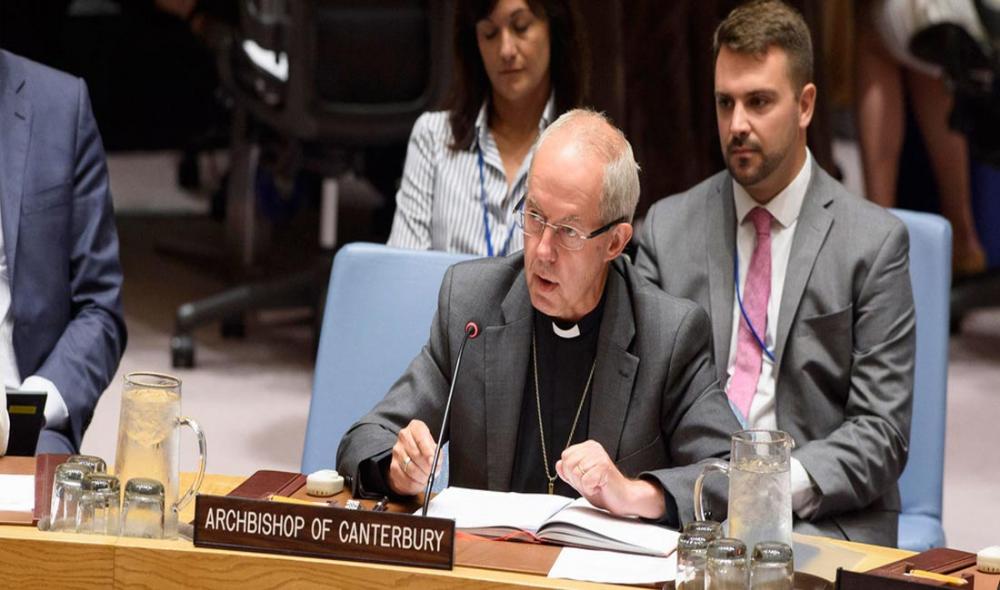Just Earth News | @JustEarthNews | 30 Aug 2018, 05:53 am Print

Loey Felipe
New York, As war and the mediation of peace have become increasingly complex, innovative thinking is needed to save and improve the lives of millions, United Nations Secretary-General António Guterres told the Security Council on Wednesday.
Speaking alongside the UN chief were the Archbishop of Canterbury, Justin Welby, a member of his High-Level Advisory Board on Mediation, and Mossarat Qadeem, the co-founder of PAIMAN Alumni Trust, a civil society group working to prevent violent extremism in Pakistan.
As speakers at the day-long debate warned that the maintenance of international peace and security faces multiple challenges, Guterres noted that many internal conflicts feature a deadly mix of fragmented armed groups and political interests, funded by criminal activities, and that peace agreements are becoming more elusive and short-lived.
Archbishop Justin expressed concern that the international rules-based order is struggling, with national interests too often allowed, “even in this chamber”, to overcome the wisdom of those who have lived through war.
For this reason, the Secretary-General has made diplomacy for peace one of his key priorities, with a focus on prevention and investment in mediation, peacebuilding and sustainable development.
As an example of his commitment, he pointed to the creation of the High-Level Advisory Board on Mediation in September 2017, which aims to allow the UN to work more effectively with regional organizations, non-governmental groups and others involved in mediation around the world.
Guterres pointed to the work of Board member and former Nigerian President Olusegun Obasanjo – who travelled to Liberia on behalf of the Secretary-General to support the peaceful transfer of power after the 2017 elections – as an example of how the Board can be deployed in the cause of conflict prevention.
He added that the UN is already has a wide range of mediation resources at its disposal, including special envoys and representatives pursuing consultations, good offices and formal talks.
An example is the UN Standby Team of Senior Mediation Advisers, a group with expertise on a wide range of issues connected to peace negotiations. The group, part of the UN Mediation Unit, is providing crucial advice in areas of conflict, from the Central African Republic to Yemen and South Sudan.
Archbishop Justin described the Unit as a vital component of the UN’s cross-agency and cross-departmental reconciliation strategy, which is helping to build shared understanding between the UN and its partners.
Guterres told the Council that the UN recognizes the important role played by an “enormous range” of actors, from national bodies to civil society group, women’s organisations, religious leaders and young activists.
In South Sudan, where a peace deal has recently been agreed, the UN envoy there is supporting local efforts to address communal conflicts and, as Archbishop Justin explained, church leaders are playing an increasingly important role in moving the South Sudanese peace process beyond its current roadblocks.
The Secretary-General and Qadeem both emphasised the importance of investing in women’s meaningful participation and leadership in peace processes. Guterres cited the emergence of regional networks of women mediators, such as the Nordic Women’s Mediators’ Network and the African Union’s FemWise group.
Qadeem highlighted ways in which women have been excluded from mediation, with many sceptical of their ability to talk to violent extremist groups like the Tamil Tigers or the Taliban. In fact, women have played mediation roles in both cases.
For example, several years ago a group of mothers of missing soldiers in Sri Lanka successfully mediated a ceasefire, which was followed by peace talks. And Ms. Qadeem shared her own experience of speaking with the Taliban in Pakistan.
“I found the courage not only to speak with them to release my staff members they had captured, but I took the chance to seek support for the implementation of health and education projects. This is mediation.”
The UN chief told the Council that a changed conflict landscape calls for bold, creative thinking in international mediation: using social media effectively as a tool to bring communities together, speaking with one voice, and supporting the mediation efforts of regional and sub-regional organisations. “Innovative thinking on mediation”, he said, “is no longer an option; it is a necessity.”
- India rejects allegations, urges Pakistan to tackle its ‘home-grown ills’
- Massacre in Islamabad: ISIS takes responsibility for deadly Pakistan blast
- Friday turns fatal: 31 dead, 169 injured in shocking Pakistan mosque blast
- Explosion at packed mosque in Pakistan turns Friday prayers into scene of carnage, 15 dead
- Security forces handicapped: Pakistan Defence Minister’s shock admission on Baloch violence





-1763561110.jpg)
